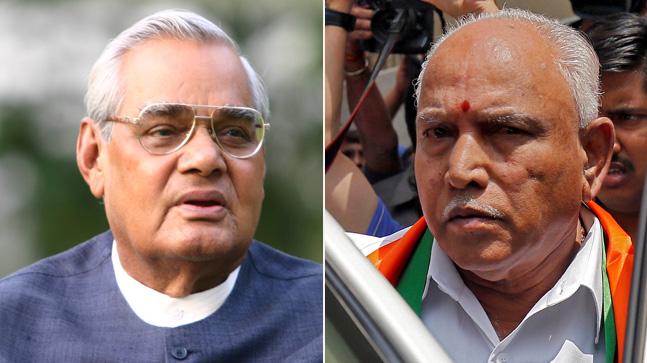The turn of events that compelled the BJP’s BS Yeddyurappa to resign as Karnataka chief minister was a flashback to 1996 when a similar fate had forced then prime minister Atal Bihari Vajpayee to resign his post.
Yeddyurappa resigned after delivering a stirring 20-minute speech in which he broke down and lamented the lost chance to turn Karnataka into “paradise”.
This was the third time Yeddyurappa was giving up the chief minister’s chair well before the end of his term; his latest stint as Karnataka CM was the shortest — he stepped down just two days after taking the oath.
Vajpayee had assumed office as the 10th prime minister of India in May 1996. He was invited by the president to form the government after the BJP emerged as the single largest party in the Lok Sabha elections. The BJP had won 161 seats out of 545. Along with its allies, the party had gained authority over 194 seats. The majority mark required to form the government was 272.
Vajpayee held the position of prime minister for 13 days. However, he failed to garner enough support and was eventually forced to step down. After Vajpayee’s resignation on May 27, 1996, his government was replaced by an alliance between the Congress and the HD Deve Gowda-led United Front. The Congress, which was the second largest party with 140 seats, gave the United Front outside support.
Yeddyurappa would have gone on to serve as chief minister for at least 15 days, beating the eight-day he record set in 2007. The top court, after a rare post-midnight hearing, advanced Yeddyurappa’s floor test, giving him just over 24 hours to prove that he enjoyed majority support in the Karnataka Vidhana Soudha. Allegations of horse-trading and audio tapes with alleged voices of top BJP leaders — including Yeddyurappa himself — soon surfaced as the Congress went on an overdrive in order to protect its southern bastion.
In the end, it wasn’t the allegations but the numbers that did the BJP in. The Bharatiya Janata Party, with its 104 MLAs, simply did not have the numbers to beat the Congress-JDS post-poll alliance’s 116 legislators.
As an independent media platform, we do not take advertisements from governments and corporate houses. It is you, our readers, who have supported us on our journey to do honest and unbiased journalism. Please contribute, so that we can continue to do the same in future.

